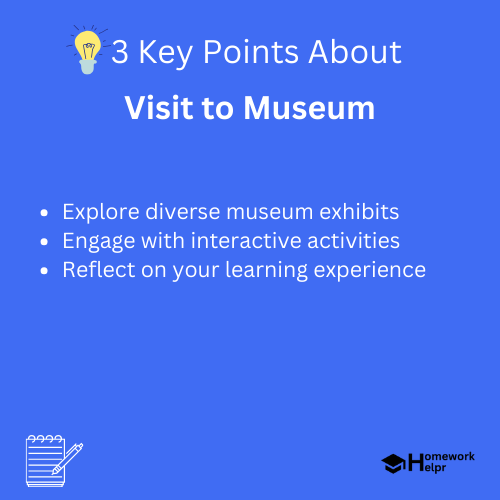📝 Summary
Visiting a museum provides an exciting and educational experience for students and children, connecting them with history, art, and cultural heritage. Museums are important for preserving knowledge and inspiring future generations through various types such as art, history, and science museums. To maximize the experience, it‚’ vital to prepare in advance, engage with exhibits, and reflect after the visit. Ultimately, museums serve as windows into human achievements and experiences, making them valuable educational resources.
Visit to the Museum: A Journey into History and Art
Visiting a museum can be one of the most exciting and educational experiences for students and children. Museums serve as vaults of history, art, and culture, allowing us to connect with the past while appreciating the world around us. In this article, we will explore the significance of museums, what to expect during a visit, and how to make the most of the experience.
Why Museums are Important
Museums play a crucial role in our society. They are not just places to admire old artifacts or paintings; they help preserve knowledge, promote cultural heritage, and inspire future generations. There are different types of museums, including art museums, natural history museums, science museums, and more. Each type captures unique displays that reflect human achievements and experiences.
Definition
Cultural Heritage: The legacy of physical artifacts and intangible attributes of a group or society inherited from past generations. Artifact: An object made by a human being, typically one of cultural or historical interest.
Types of Museums
When you visit a museum, you will discover various types of exhibits. Here are a few examples:
- Art Museums: These museums showcase paintings, sculptures, and decorative arts. Famous examples include the Louvre in Paris and the Metropolitan Museum of Art in New York City.
- History Museums: These focus on historical artifacts and documents that narrate events from a specific period. The British Museum is a prime example.
- Science Museums: They feature interactive exhibits related to tech, physics, biology, and chemistry. The Exploratorium in San Francisco is popular among students.
Preparing for Your Visit
Before you set off for your museum adventure, it is essential to plan. Here are some steps to consider:
- Research: Find out what exhibits are available and if there are any special events.
- Prepare Questions: Think about what interests you the most, and write down any questions you’d like to ask.
- Bring Supplies: A notebook can be handy for jotting down facts and observations.

What to Expect at the Museum
Once you arrive at the museum, you may be surprised at how large and diverse it is. Here‚’ what to expect during your visit:
- Guided Tours: Many museums offer guided tours that provide deep insights into various exhibits.
- Interactive Exhibits: Particularly in science museums, you may find hands-on activities that engage all your senses.
- Workshops: Some museums provide workshops where you can create your own art or engage in educational activities.
❓Did You Know?
The largest museum in the world is the Louvre, located in Paris, which attracts millions of visitors each year!
Making the Most of Your Museum Visit
To ensure you get the most out of your visit, follow these tips:
- Be Curious: Don’t hesitate to ask questions from museum staff and guides.
- Take Your Time: Don’t rush through the exhibits. Take time to appreciate each piece.
- Share Your Thoughts: Discuss your favorite exhibits with friends or family to enhance the learning experience.
Examples
For instance, if you see an ancient Egyptian sarcophagus, think about the civilization that created it and why it was significant. Discuss with a friend what you learned about their culture.
After Your Visit
Once you are back home, your museum experience can continue to enrich your knowledge. Here‚’ how:
- Reflect: Write down what you learned and your favorite exhibits.
- Research Further: Use books or the internet to explore topics that piqued your interest during the visit.
- Visit Again! Consider visiting museums again to foster a deeper understanding and connection to the exhibits.
Examples
If you enjoyed the science exhibits, you might want to read about physics or conduct simple experiments at home to apply what you learned.
Conclusion
In conclusion, visiting a museum is not just about observing artifacts and paintings; it’s a chance to engage with the world‚’ history and culture. By preparing ahead, asking questions, and reflecting on your experience, you can transform a simple visit into a profound learning journey. Museums offer us windows into different eras and ideas, helping shape our understanding of humanity and inspiring future explorations. So, grab a notebook, plan your trip, and get ready to embark on an educational adventure!
Related Questions on Visit to Museum
What types of museums are there?
Answer: Various types include art, history, and science museums.
How can I prepare for a museum visit?
Answer: Research exhibits and prepare questions beforehand.
What should I expect during my visit?
Answer: Expect guided tours, interactive exhibits, and workshops.
Why are museums important?
Answer: They preserve cultural heritage and inspire future generations.
